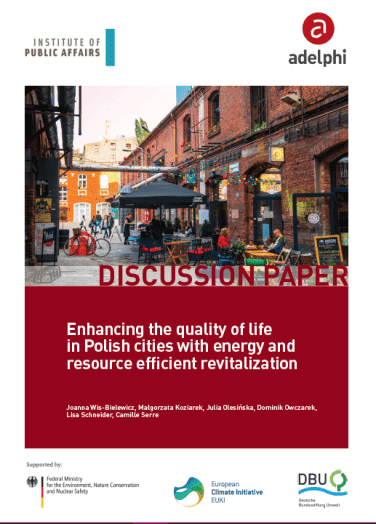Unsustainable development has taken its toll on the urban fabric, bringing about a number of negative effects, such as congestion, low-stack pollution and urban sprawl. Considering the overall well-being of urban dwellers and their good health, the environmental footprint of cities should be mitigated with new investments and redevelopments that are resource and energy-efficient.
Relevant concepts, planning tools, as well as policy frameworks and measures have been available at global, European and national level. All those solutions, combined with lessons from the past decade of revitalization experience and available funding present Poland with
a unique opportunity.
Along with the idea of placing energy and resource efficiency into the heart of Polish revitalization effort, a chance emerges to reshape Polish cities into attractive, healthy and economically vital communities. This scenario would help to effectively tackle major challenges such as shrinking resources, air pollution or risks related to climate change, as well as pave the way for others to follow.
Having presented an outline of urban revitalization concept, its history, multidimensionality and its links to notions of sustainable development, quality of life and environmental value, this document sets the stage for discussion on the revitalization track record in Poland – an ongoing process, characterized by continuous neglect of the effects that urban pressure puts on the environment. This has also been highlighted in the Polish Act on Revitalization 2015, which seems to ignore global challenges, as well as the resource and energy-efficient urban development paradigm.
The situation is expected to change, as the relevant European policy goals have been directly reflected in the Partnership Agreement and funding schemes for 2014-2020. Additionally, several Polish policy documents (e.g. The National Urban Policy 2023, The Strategy for Responsible Development [SOR]) link urban development with sustainability, resource efficiency and the low-emission transition.
By presenting global, European and national data, this paper highlights the negative consequences of inefficient urban development patterns with respect to land use, mobility and built substance. It also outlines tools and measures supporting resource and energy
efficiency in urban planning and management. Last but not least, the document summarizes health and economic benefits awaiting neighbourhoods, districts and cities in relation to energy-efficient revitalization.
Two existing policy frameworks: The Polish Programme for Model City Revitalization and the German energy-efficient urban redevelopment programme (KfW 423) have been presented as prime examples of the leadership that national governments can provide to shape the sustainable, resource and energy-efficient city renewals. Simultaneously, the case studies of Łódź and Potsdam-Drewitz are perceived as inspirational models of good practice in this area.

